| SHADOWS ON THE WALL | REVIEWS | NEWS | FESTIVAL | AWARDS | Q&A | ABOUT | TALKBACK | |||||||||||||
 Shadows off the beaten path Shadows off the beaten pathIndies, foreign, docs, revivals and shorts...
On this page:
THE GOSPEL OF EUREKA | |||||||||||||
| See also: SHADOWS FILM FESTIVAL | Last update 8.Feb.19 | |||||||||||||
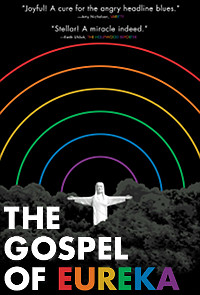
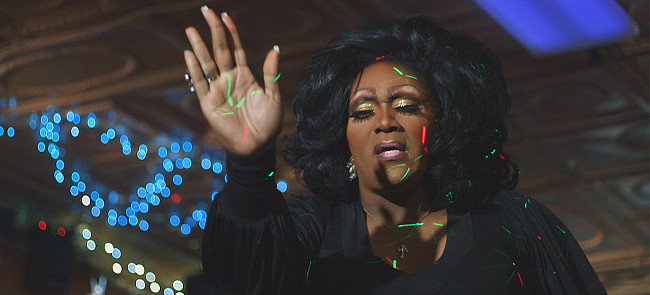
The Gospel of Eureka Review by Rich Cline | 
| |||||||||||||
|
dir Michael Palmieri, Donal Mosher scr Donal Mosher prd Charlotte Cook with Lee Keating, Walter Burrell, Kent Butler, Randall Christie, Jayme Brandt, Roxie Howard, Felicia Blackheart, Allen Haines, Ginger Styles, Daniel Carl Fose, Charnay Malletti Cassidine, Fred Young narr Justin Vivian Bond release US 8.Feb.19 18/US 1h13 
|
Beautifully written and edited, this documentary centres on an unusual corner of the world where devout Christians mix with the LGBTQ community. The filmmakers wisely avoid commenting on the issues, cutting scenes together with knowing wit to make an important point, bracingly highlighting the hypocrisy of people who use the Bible to justify bigotry. And the personal stories earn the viewers' tears.
Eureka Springs, in the Arkansas Ozarks, was built around waters Native Americans believed to be healing. It's home to The Great Passion Play, which extravagantly re-enacts the gospel story with a cast of 170 on village-sized sets for an audience of 4,000, double the town's population. Rising through the trees is the dramatic statue Christ of the Ozarks, the largest image of Jesus in North America. And just down the road is the lively Eureka Live Underground, where a diverse and inebriated crowd is entertained by sassy drag artists. Clever filmmaking draws out deep meaning through evocative stories. Being a Christian is about who you love, not who you sleep with, says one resident about the juxtaposition of these two communities. The local pastor preaches that the Bible has been badly abused to terrorise segments of society. But there are still people here who vehemently oppose the LGBTQ community, so battles rage on a variety of fronts. The film covers one campaign, as locals rally to pass legislation that would make it illegal to discriminate against gay people. The film explores these clashing opinions, tracing them to Anita Bryant's crusade against equal rights in the 1970s. And of course this part of America has a long history of hideously violent hate crimes. But the filmmakers' focus is on the people in the town, including gay couples, conservatives, trans women and others who share personal feelings and experiences. The respect they show for each other is remarkable because it's so rarely depicted on-screen. And it's presented with a warm sense of humour, honesty and passion. Along the way, there are comments about the impact of Aids, emotionally captured in a photo album, which of course is a kind of holy book. There's considerable footage of The Great Passion Play here, beautifully shot with the camera in the middle of the action. And cutaways to lively religious-themed performances in the bar add increasingly provocative textures to the film. The implication is that both are forms of worship. And both have a striking honesty to them as well.
| ||||||||||||
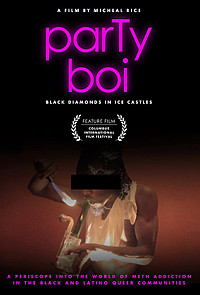
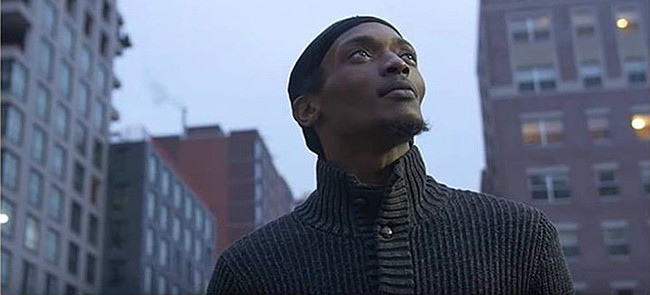
ParTy Boi: Black Diamonds in Ice Castles Review by Rich Cline | 
| |||||||||||||
|
dir-prd Michael Rice scr Michael Rice, Edward Radford with Michael Robertson, LaTisha Nixon, Kalvin, Omar, Dae Dae, Jorge, Michael, TK, Andre, Tre, Tia, Desi, Hamza, Kaimi release UK Apr.18 bou, US May.18 pw 18/US 54m |
Filmmaker Michael Rice spent a year exploring the impact of crystal methamphetamine on black gay men in New York and Los Angeles. He sees this drug as entwined with issues of race, sexuality and equality in America. The question is whether this is a sign of something deeper for people who are black and gay, members of two marginalised communities.
The film interviews a range of men, letting them share their stories. Some are dealers, some have escaped addiction, others still using. They discuss how crystal meth (aka ice, tina or T) is used with sex because it removes inhibitions and makes you want to do whatever feels good in the moment, regardless of the consequences. This is a drug that takes over each user's life, whether they want it to or not. So it often goes along with prostitution, helping relax resistance to an unattractive client. The footage is astonishing, as these guys speak with almost frightening honesty. They talk about how they first encountered meth, and how super-rich rich white men use it get the kind of black men they want and keep them under control. For example, Dae Dae insists that meth has not had any impact on his life at all, then reveals that he perhaps knows more than he's letting on. Jorge proudly talks about getting high and having unsafe sex, loving the fantasy in his mind rather than what's really happening. Going deeper, Omar talks about how he needed it when he was an escort, so his turning point was when he started using it by himself. And LaTisha tells her son Gemmel's story, about moving to Los Angeles and dying of an overdose. In between interviews, Rice looks at gay history, such as how harsh laws created a culture of cruising for sex, which transformed into gay geo-positioning dating apps full of codes and emojis that reference meth. Rice also speaks to experts who can explain the problem objectively about a drug that's been around for more than a century, a pure chemical easily made in underground labs. As a party drug, its image comes from Breaking Bad as something used by the white middle class. But it rose in popularity during voguing culture in the 1970s and 1980s in black communities. While the conspiracy theories (about how white culture is using meth to control the blacks) get a bit pushy, the main points the film raises are shocking and important.
| ||||||||||||
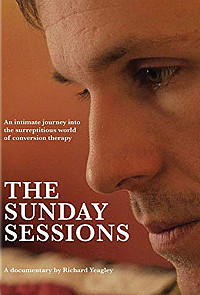

The Sunday Sessions Review by Rich Cline | 
dir-prd Richard Yeagley
With a fly-on-the-wall style, filmmaker Richard Yeagley captures a young man's journey as he sets out to rid himself of his homosexual desires. Chapters are introduced with titles, then otherwise presented without comment. And it's stunningly intimate footage, drawing out strong emotions while stoking the viewer's frustration at manipulative methods the patient can't see being used on him. It's never simplistic, and rarely easy to watch.
| Conversion therapy attempts to change a person's sexual orientation, but has been proven to be ineffective and denounced by every major health organisation. And yet it is still legal in the United States. Therapist Chris Doyle claims he can help people get rid of desires they don't want to have. At 26, Nathan is an intelligent, articulate, devout Christian who doesn't want to be gay, so he enrols himself in a conversion therapy programme, then sessions at Doyle's home over two years. "I want to be human and happy," he says, seeing this therapy as helping him not have to choose one over the other. The camera witnesses group therapy involving roleplaying, prayer and mutual support before settling in to Nathan's one-on-one sessions with Doyle, who clearly has an understanding of psychology as he helps Nathan confront his tendencies toward self-deprecation. But there's also a creeping sense of Doyle's agenda as he twists reality and emotions in a deliberate direction. It's intriguing to see scenes of Nathan as an actor aware that he's performing both on stage and in his everyday life. Nathan speaks about putting on a face of strength to hide a weakness that has gripped him for so long. He hates that this is an issue for him, feeling like other people find happiness much easier than he does. He also brings his out-gay, atheist friend Cameron in to speak to Doyle, who insists sexuality is developmental. Nathan and Cameron's conversation afterwards is lively and revelatory, as is the way Doyle passively convinces Nathan to limit his contact with Cameron. Which leaves Nathan unhappy, unstable and angry. The film is beautifully shot mainly in close-up, as Yeagley never undercuts anything said on-screen, allowing everyone speak while candidly observing the way Nathan grapples with certainty in every aspect of his life. This reverence for personal beliefs and opinions makes this documentary even more important, as it lets the audience sift through the material on its own terms. So the real power of this film is the encouragement to listen without prejudice, and also to recognise when you're caught in a spiral of false hope. Where it leaves Nathan is chilling.
| 
See also: SHADOWS FILM FESTIVAL © 2019 by Rich Cline, Shadows
on the Wall
HOME | REVIEWS | NEWS | FESTIVAL | AWARDS
| Q&A | ABOUT | TALKBACK | | ||||||||||

